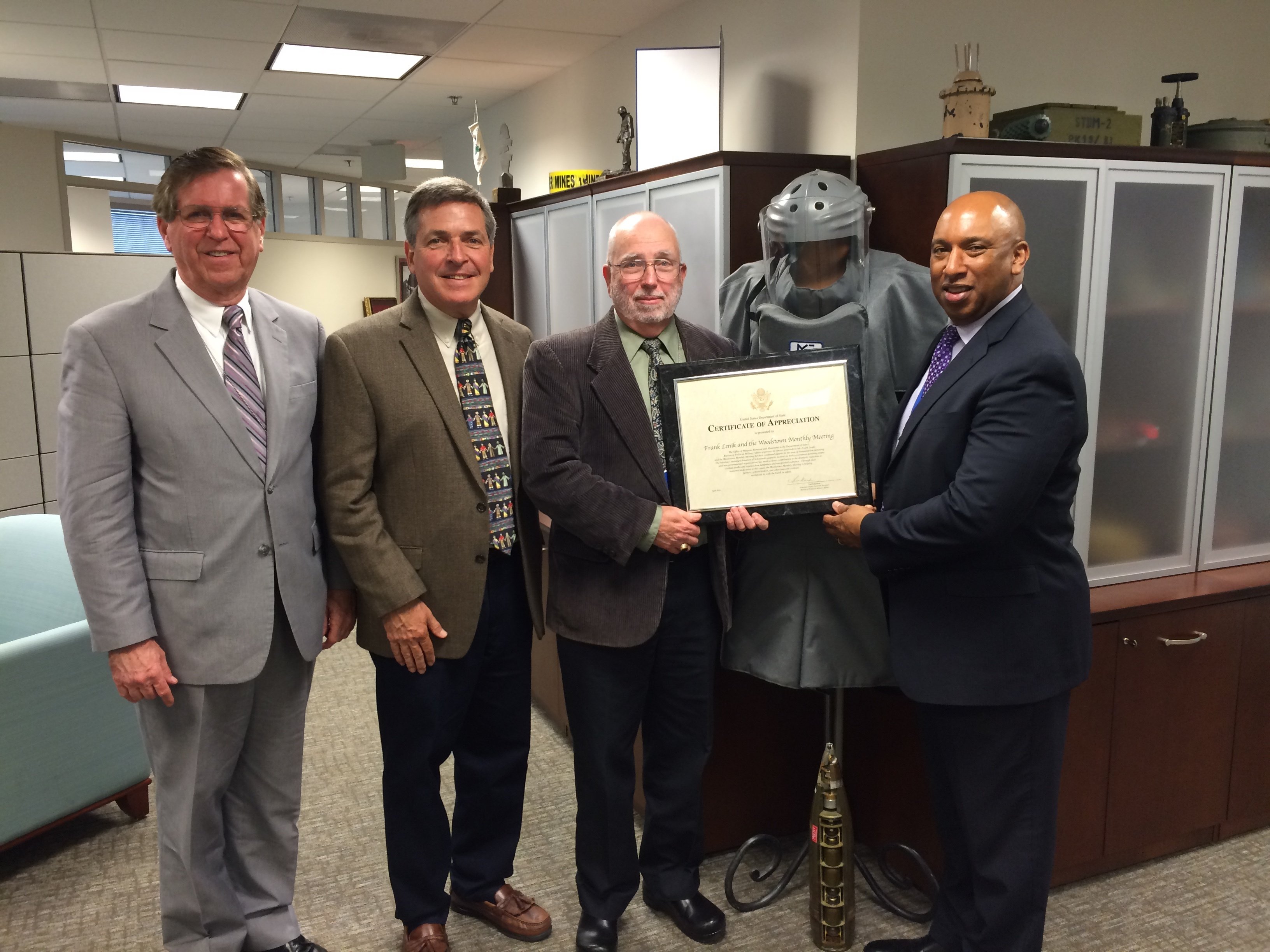Schonstedt Continues Humanitarian Demining Efforts
June 15, 2016
Schonstedt Instrument Company, a small manufacturing company located in Jefferson County, West Virginia, remains committed to making the world a safer place through the donation and deployment of its instruments, which are used to find landmines and explosive remnants of war.
Recently, representatives of Schonstedt attended a presentation at the United States Department of State  in Washington, D.C., where Frank Lenik and the Society of Religious Friends (Quakers) of Woodstown, New Jersey, received a certificate of appreciation for their continued support of the Schonstedt Humanitarian Demining Initiative (SHDI). The Woodstown Monthly Meeting group has been responsible for the deployment of more than 100 Schonstedt magnetic locators to humanitarian demining teams worldwide, contributing dramatically to the reduction of civilian deaths and injuries from unexploded ordnance.
in Washington, D.C., where Frank Lenik and the Society of Religious Friends (Quakers) of Woodstown, New Jersey, received a certificate of appreciation for their continued support of the Schonstedt Humanitarian Demining Initiative (SHDI). The Woodstown Monthly Meeting group has been responsible for the deployment of more than 100 Schonstedt magnetic locators to humanitarian demining teams worldwide, contributing dramatically to the reduction of civilian deaths and injuries from unexploded ordnance.
Schonstedt specializes in making instruments that locate underground objects. The company’s pipe and cable locators find and trace underground utilities, and its magnetic locators find ferrous metals such as boundary markers used by surveyors. The magnetic locators are also proven successful at locating unexploded ordnance, which lead to the creation of the SHDI, according to Bob Ebberson, program manager at Schonstedt.
In 2007, in response to an unmet need for humanitarian demining among the world’s underserved populations, Schonstedt reached out to the United Nations with an offer of assistance. It would provide free magnetic locators for use in areas of the world where demining would not otherwise be possible. The United Nations Mine Action Service (UNMAS) agreed to identify and prioritize those areas and facilitate deployment of the tools. Schonstedt also partnered with the U.S. Department of State, Bureau of Political-Military Affairs, Office of Weapons Removal and Abatement, for support and assistance in determining where the need was the greatest.
For every magnetic locator purchased for donation, Schonstedt matches the contribution, unit-for-unit, and absorbs all program administrative costs. Each of the tools costs $1,041. To date, 507 donated magnetic locators have been deployed to 28 countries, including Laos, Somalia, Kenya, Tajikistan, Vietnam, Nepal, Egypt, Mauritania, Ethiopia, Croatia, Chad, Azerbaijan, Gaza, Cambodia, Algeria, Lebanon, Libya, the Central African Republic, Uganda, and the Darfur region of Sudan.
Currently, Schonstedt has 25 employees. “We are proud to be a 100 percent employee-owned company. So when we donate one of these instruments, we are essentially making a personal contribution to this effort,” Ebberson said. “Everybody here at Schonstedt is happy to do it. It’s a good feeling knowing that we are contributing to saving lives around the world.”
“Schonstedt has been a long-time employer in Jefferson County,” said John Reisenweber, executive director of the Jefferson County Development Authority. “We value the economic impact that Schonstedt has provided for the local community as well as the humanitarian impact that they have had on civilian health and safety worldwide.”
Founded in 1953 by Erick O. Schonstedt, the company started by designing instruments for use in the aerospace industry, producing magnetometers for more than 400 satellites as well as the Hubble telescope. In 1998, Schonstedt moved to its custom-built headquarters in Kearneysville, W.Va., about an hour’s drive from Washington, D.C., and Baltimore. Today, the company is known for its instruments to locate iron and steel (ferrous) objects and pipes and cables (linear underground conductors). Schonstedt’s patented Heliflux® magnetic sensor technology is unsurpassed for its environmental stability and ability to detect ferrous objects to extreme depths.
For more information about the Schonstedt Humanitarian Demining Initiative, contact Bob Ebberson at bebberson@schonstedt.com or call 304-724-4754.
ADD ITEM TO REPORT
As you navigate our website, you can use the “Add Item to Report” button to add any page or property to a custom report that you can print out or save.


